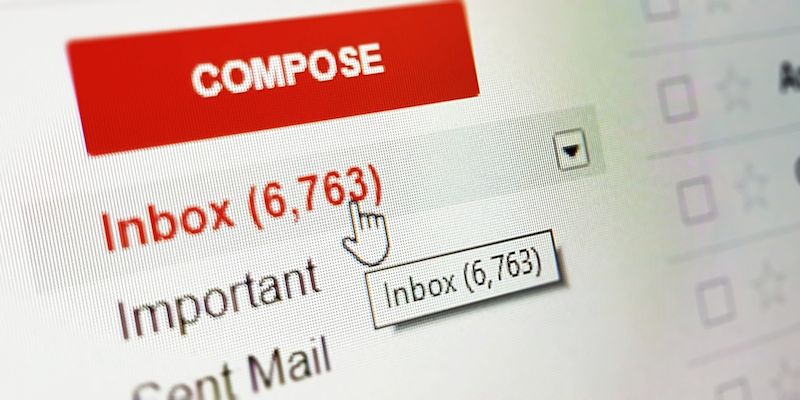
Top 10 Safe Email Practices
Let's go way back to the infancy of the Internet, back to the days of dial-up and AOL, and the very first cases of cyberattacks. The target back then was email. After all the advances in technology and all the intricate ways that cybercriminals have implemented their attacks, email scams still remain one of the most common vulnerabilities to cybersecurity.
Perhaps it's because technology has become more advanced that we often fail to recognize the simplest—and often most obvious—risks in plain sight. Email attacks are effective, in part, due to the fact that email seems so benign, and people don't take the threat seriously.
That's why it's important to brush up on what you can and should do to ensure that you don't make a spur-of-the-moment mistake. Here are our 10 top tips for ensuring email safety.
Top 10 Safe Email Practices
- Don't Click On Strange Links
- Change Your Passwords Periodically
- Be Aware of Language and Grammar
- Don't Reply to Spam Emails
- Always Log Out
- Install a Spam Filter
- Run Anti-Virus Software
- Be Aware of What You Share
- Practice Caution From the Start
- Recognize that You are a Target
1. Don't Click On Strange Links
Despite their better judgement, people continue to click on strange links sent to them via email. Maybe it's curiosity, or just a natural response, but when sent a link in the body of an email from an unknown sender, DO NOT CLICK. If it is sent from a friend or acquaintance with no other message in the body, DO NOT CLICK, as it is safe to assume their email has been hacked and you are the next target. When in doubt, contact the sender personally to ensure that they sent you the link themselves.
2. Change Your Passwords Periodically
If you've have kept the same password for your email—or any other account for the matter—the same for years, now is the time to change it. Changing your password is a great defence in keeping your email account safe from hackers. Using a mix of letters, numbers and characters is also recommended.
3. Be Aware of Language and Grammar
No legitimate or reputable company will send you an email that is poorly written with spelling and/or grammatical mistakes. If it doesn't read properly, discard right away. It is likely a phishing attack.
Despite their better judgement, people continue to click on strange links sent to them via email. Maybe it's curiosity, or just a natural response, but when sent a link in the body of an email from an unknown sender, DO NOT CLICK.
4. Don't Reply to Spam Emails
Not interacting with spam includes not clicking an “Unsubscribe” link in an email from a sender that you do not recognize. If you don't remember giving your information to the sender, do NOT reply or click on any links. They are baiting you by appearing to be a legitimate company you might have signed up to.
5. Always Log Out
When using a public computer, always make sure to log out. If you bring your laptop to coffee shops or other public places, it's a good idea to not have an automatic sign-in on your email account. Always keep in mind that using a public computer or network can give others access to your data.
6. Install a Spam Filter
Spam filters protect you from spam emails, as well as flag incoming emails that may be hacked or infected. With some configuration, spam filters can also help automatically block junk mail entirely. Especially when using your email to exchange business or sensitive information, a spam filter is a great first line of defence.
7. Run Anti-Virus Software
Install a reputable and well-known anti-virus software onto your computer. This can help prevent an infection before it even reaches you. When installed, make sure you keep your anti-virus software updated. All too often, people get notifications to update their security software but put it off—often for months. Taking the time to install updates means your software is running at its peak efficiency and that you stay protected.
8. Be Aware of What You Share
Once you send a message, its contents are completely out of your control. Keep that in mind every time you transfer financial or sensitive information to another email address. Whenever in doubt, contact the recipient via multiple modalities. And remember, no bank or reputable company will request sensitive information, such as bank account numbers or your SIN, via email.
9. Practice Caution From the Start
Before you are even presented with an infected link, the sender and subject is often a clue to whether or not the email is safe to open. If it seems suspicious from the onset, it's probably a good idea to delete the email before even opening it. Don't take an unnecessary chance.
10. Recognize that You are a Target
The one major roadblock in preventing you from becoming a victim of an email spam is the assumption that you aren't at risk. There are no small potatoes when it comes to cybercriminals—in fact, they thrive on the unknowing and the unexpecting. Large companies and major executives have the means to be well protected, and that makes them less desirable for criminals. They prey on those who feel secure because they don't think they are a worthy target—and that’s when they get you.
Keep these top 10 safe email practices in mind and share them with your team. If you think you've been the target of a cyberattack, get in touch with CITI right away.
 |
 |






